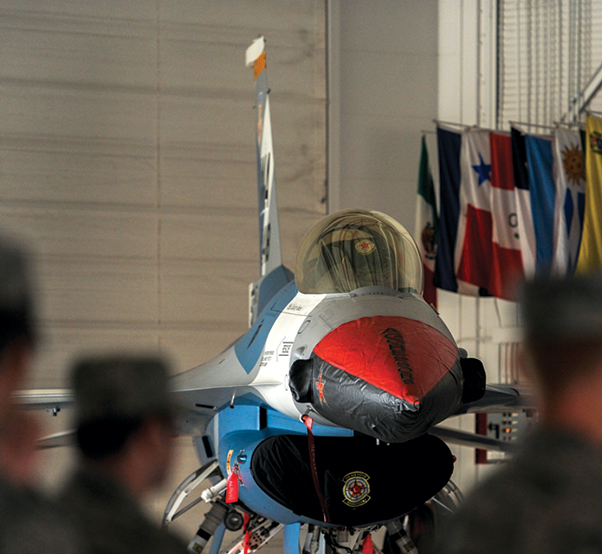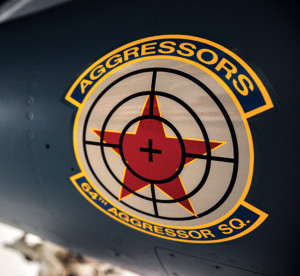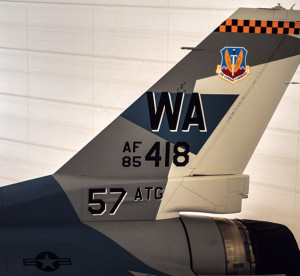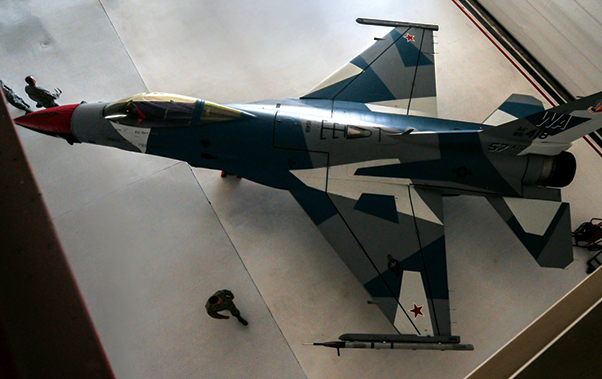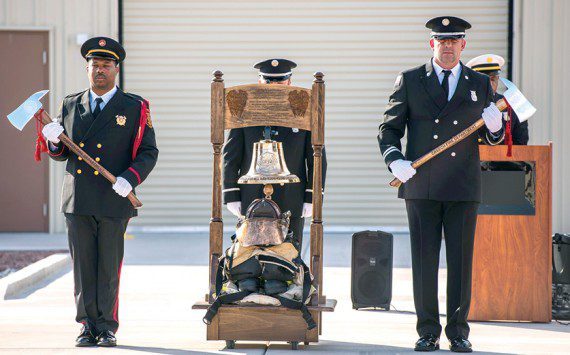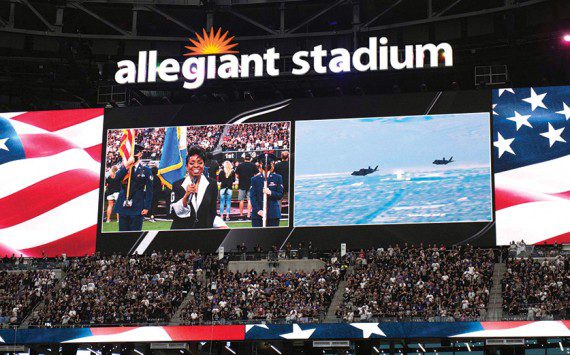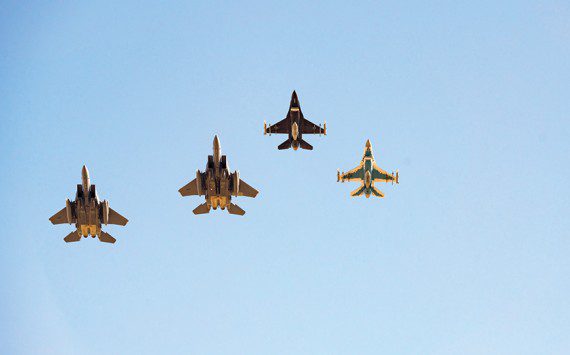The 64th Aggressor Squadron, Nellis Air Force Base, Nev., debut the new paint scheme for the F-16 Aggressors during the 57th Adversary Tactics Group change of command ceremony Aug. 5. Since 1972, the 64th Aggressor Squadron has prepared combat air forces by providing realistic threat replication and training.
NELLIS AIR FORCE BASE, Nev. — Since 1972, the 64th Aggressor Squadron has prepared combat air forces by providing realistic threat replication and training.
On Aug. 5, the 64th AGRS unveiled the new “splinter” paint scheme for the F-16 Aggressors at Nellis Air Force Base during the 57th Adversary Tactics Group change of command.
The new paint scheme for the F-16 will serve as the closest representation of real world threats for pilots who train at Nellis.
“The paint scheme is a means of representing threats more accurately,” said Capt. Ken Spiro, 64th AGRS chief of intelligence. “There are real world threats that paint their jets in this way so we are changing over to make it more physically like their aircraft. Once a pilot who is training comes within visual range of the new Aggressor, they’ll be seeing a similar situation to what they would see with an actual threat aircraft.”
To represent these threats more accurately, the 64th AGRS looks for any and all ways to try to emulate the threats that are opposing combat air forces.
“The idea started at the 64th AGRS because we’re always looking for different ways to be more threat representative, and make the training more realistic,” said Spiro. “The 64th AGRS gets creative in extra ways, such as paint schemes to accurately and better represent threats. We act like, look like, or anything you can think of we try so we can be true to the threats. We’ve had some jets that are painted like a regular F-16, and then we’ve had some that have more of a tiger stripe pattern. Our F-16’s paint schemes have been similar to threats in the past and this new scheme is more representative of today’s threats.”
The tail flash of an F-16 Fighting Falcon, assigned to the 64th Aggressor Squadron, with the new “splinter” paint scheme sits in the U.S. Air Force Thunderbird hangar at Nellis Air Force Base, Nev., during the 57th Adversary Tactics Group change of command ceremony Aug. 5. To represent threats more accurately, the 64th AGRS looks for any and all ways to try to emulate the threats that are opposing combat air forces.
In order to better emulate these threats, the 64th AGRS went to M1 Support Services in order to make their vision a reality.
“Viper Aircraft Maintenance Unit approached us and expressed their interest in the new paint schemes, and our role was to take the photos they had and adapt them to the F-16,” said Mr. Jeffery Dezell, M1 Support Services corrosion shop lead. “Once adapted, Viper AMU made any changes they wanted and once they were satisfied with the product, they ran the paint scheme through the approval process. Once it was approved, we proceeded to paint the aircraft.”
The process of painting the newest scheme on the F-16 Aggressors is one that doesn’t happen over-night. It took nearly three weeks to finish the first version.
“It is also a hard line paint scheme rather than a soft one,” said Dezell. “Basically, rather than painting all the colors at once, with this new paint scheme we have to paint one color at a time. It’s more labor intensive and takes longer to complete. It’s a one of a kind paint job that no one has done before.”
This one of the kind “splinter” scheme is one of two different paint schemes that will be introduced in the coming months.
“This is the first F-16 Aggressor with the newest scheme and we are working on a second ‘shark’ scheme because the 64th AGRS would like to see two threats eventually,” said Dezell. “That scheme is in the design stages right now and the preliminary designs have been sent over to Viper for their changes and approval.”
These new paint schemes are the just two of the multiple ways the 64th AGRS provide advanced, relevant, and realistic training to air combat forces.
Airmen, attending the 57th Adversary Tactics Group change of command ceremony, take the first look at the new F-16 Fighting Falcon, assigned to the 64th Aggressor Squadron, paint scheme in the U.S. Air Force Thunderbird hangar at Nellis Air Force Base, Nev., Aug. 5. This one of the kind “splinter” scheme is one of two different paint schemes that will be introduced in the coming months.






